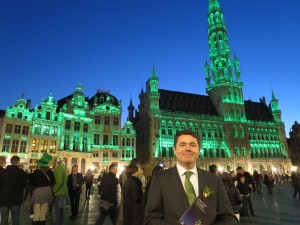My St. Patrick’s weekend, from Sunday to Tuesday night, was spent in Brussels. This was the first St. Patrick’s Day I had spent away from home and while I missed spending it with my family, it really gave me an understanding of the extent of the celebrations and the importance placed by our diaspora, and those who claim to be Irish for the day, on 17th March.
Along with more than 100 other sites around the world that we’re being ‘greened’ in honour of our national feast day, I took part in the greening of the Grand Place in Brussels on Sunday, which was going green for the first time. The impact of this Tourism Ireland initiative has grown from strength to strength, with a growing list of sites including Petra in Jordan and Whistler in Canada also joining for the first time this year.
As part of the St Patrick’s Day celebrations in Belgium, I also unveiled the Manneken Pis in full Irish rig-out; Aran jumper and tweed flat cap, no less. The turnout to see this Irish costume, which joins a wardrobe of more than 920 others, was phenomenal, and comprised people from all over the world proudly decked head or toe in varying shades of green.
Other events on the programme included an evening of Irish theatre and supporting An Bord Bia and Irish companies at a major Belgian food fair. On Monday evening I was the guest of honour at a St Patrick’s Day reception, organised by our Ambassadors in Brussels, which was attended by more than 700 members of the Irish community.
I was exceptionally proud to represent Ireland abroad this weekend and also to articulate our country’s views at the Foreign Affairs Council on Monday, which was dominated by events in Ukraine.
The escalating situation, following the holding of an illegal referendum in Crimea on Sunday, forced the EU to agree measures to support Ukraine during this difficult time and to encourage Russia to de-escalate the situation. This represented phase two of the Union’s three phase approach to sanctions against Russia, following the suspension of visa and trade talks earlier in the week. The measures included targeting a list of 21 individuals who are responsible for undermining the territorial integrity of Ukraine. They are now subject to asset freezes and travel bans by the EU.
In a show of support, a decision was also taken on the early signing of the political elements of the Association Agreement with Ukraine, which will take place on Friday at the European Council meeting, which I will attend with the Taoiseach. Customs duties on Ukrainian exports to the EU have also been temporarily lifted.
The EU has been clear that the door to a resolution remains open and that dialogue is the best way forward. An importance continues to be placed on the need for an inclusive Ukrainian Government to undertake concrete reforms to address economic governance issues.
The General Affairs Council (GAC), which prepares the work for the EU Council Summit, met on Tuesday and unsurprisingly Ukraine again took much of the attention. This came against a backdrop of the Russian President, Vladimir Putin, signing a treaty with Crimean leaders on making Crimea part of Russia. While climate change and energy policy had already been scheduled for discussion among EU Heads of State the following Thursday and Friday, events in Ukraine have now made this issue a matter of absolute priority. It was on this issue that I intervened at the GAC. I also articulated Ireland’s views on the subject of EU/African relations.
The afternoon part of the (GAC) meeting consisted of a dialogue with the President of the European Council, Herman Van Rompuy, on the approaching European Council.
In advance of my trip to Brussels I was reading a book on other countries’ perspectives of Ireland in advance of our membership of the EU. That the current crisis in Ukraine initially stemmed from a desire of the people to form closer links with the Union is lost on no-one.
The escalation of the situation in recent weeks acts as a reminder of the freedoms we avail of as members of the EU that we sometimes take for granted; the freedom to travel and trade in an environment that respects shared values and the rule of law as we do. With this in mind, we remain focused on working towards a unified approach to supporting Ukraine and to finding a peaceful resolution to what is currently happening there.
Ends
